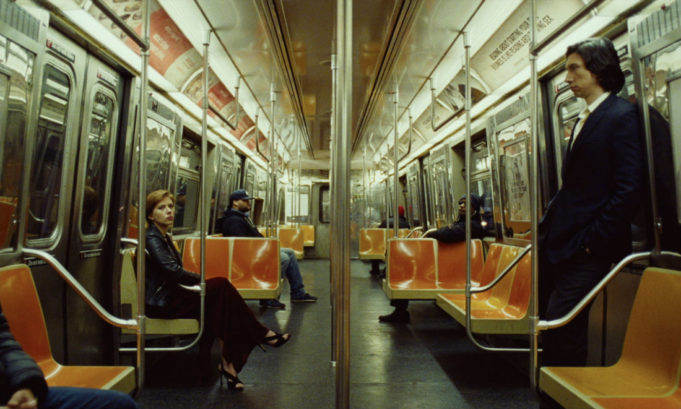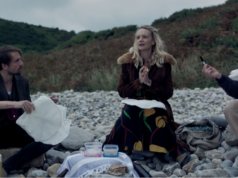Oh, Noah Baumbach, you magnificent bastard. This highly literate filmmaker often writes about scabrous divorces, and you’d be hard pressed to find one more scabrous than what he depicts in Marriage Story. It’s not easy to make a movie that destroys you emotionally with its depiction of human cruelty (which Baumbach did in Margot at the Wedding), but it’s way easier to do that than to make one that’s so compassionate that it builds you back up and sends you out of the theater filled with hope (or away from your TV, this being a Netflix film). That is the singular trick that Baumbach pulls off in this Oscar-winning masterpiece.
The film begins with Charlie Barber (Adam Driver), a widely respected avant-garde theater company director in New York, and his wife Nicole (Scarlett Johansson), the star of his company. They are writing down all the things they love about each other as an exercise for the mediator of their trial separation, but Nicole backs out at the last minute and refuses to read her list. She moves back to Hollywood with their son Henry (Azhy Robertson) because she’s been offered a TV pilot, but then the pilot is picked up for series, and Charlie refuses to accept that she might want to stay there full-time, even though her family is all in California. As so often happens, custody of the kid becomes the sticking point.
The script is full of gimlet-eyed observations not only about divorce but also the divorce industry, as Nicole and Charlie’s lawyers steer them down more contentious paths that will draw out the proceedings and make themselves more money. Charlie rents an L.A. apartment even though that makes it easier for Nicole to argue that Henry belongs in California, because staying in New York would make it seem like he doesn’t care about his son. Nicole’s lawyer (Laura Dern) states that mothers are always held to a higher standard of behavior than fathers, and says, “The system rewards bad behavior,” shortly before standing up in court and blasting Charlie for his one brief extramarital affair and his absorption in his work. Charlie’s lawyer (Alan Alda) warns him that going to war with his wife will drain both parties emotionally and financially. Charlie tells him, “You’re the first person who has spoken to me like a human being,” and then fires him in favor of a different attorney (Ray Liotta) who’s willing to dredge up Nicole’s way-in-the-past drug use.
Baumbach is an expert farceur, and he uses it for serious ends in an early scene when Nicole means to serve Charlie with divorce papers, rehearsing everything so carefully with her mother and sister (Julie Hagerty and Merrit Wever) that you know Charlie will swoop in with his usual force of personality and ruin all their plans. Charlie experiences his own nightmares, too, like an evening with Henry and a court-appointed evaluator (Martha Kelly) who appears to be observing human behavior for the very first time, or a trip to L.A. for Halloween where his attempt to take the boy trick-or-treating is stepped on at every turn. I love the performative streak in Nicole’s lawyer, who makes a show of removing her shoes in her office and sitting on a couch to induce her new client to open up.
Dern’s Oscar for this movie is well deserved, but the lead actors reach “dear God, this is scary” territory. Time and again Johansson has proved she can act (Match Point, Under the Skin, and even Lucy), and time and again that has been obscured by Black Widow and her other high-profile Hollywood gigs. She executes a tremendous single-take scene at Nicole’s initial meeting with her lawyer, pacing the floor, crying, and detailing how she went from Hollywood fame to being in the shadow of Charlie’s genius. “I got smaller,” she says, and Johansson makes that little line hurt. She and her director remind us how you can make compelling cinema with just an actor, a room, and a good speech.
Driver may be better yet. He certainly gives the best male lead performance I saw in 2019, as all of Charlie’s issues come boiling to the surface under the strain. Baumbach cast him quite well as an obnoxious hipster artiste in While We’re Young, but Driver is far more layered here, showing both the generous spirit who desperately wants to be a good father and the selfishness that lets him succeed at his job and prevents him from being happy with that success. Everything culminates in a screaming match between Charlie and Nicole in his apartment, which begins with them wanting to clear the air and then ends with him punching the wall and saying two inches from her face, “I hope you get an illness and get hit by a car and die!” Then he makes this strangled noise and crumples to the floor, realizing just how low he’s sunk.
When the divorce is finalized, the movie, somehow, wonderfully, bursts into a musical number, as a piano starts up and Charlie sings “Being Alive.” Driver can’t really sing, but this only makes the song more piercing, as Charlie’s terrible loneliness and feelings of failure well up and express themselves in Stephen Sondheim’s lyrics, leaving him naked to the world, to us, and to his actors, who are gathered around him at a piano bar. It tears your guts out.
That would have made a satisfying ending, but instead Baumbach has Henry find his mother’s list from the therapy session at the beginning and introduce a much-needed note of healing. These parents are good people who have done terrible things to each other, and as scarred as they are by the experience, they’ll eventually be okay. Marriage Story is our generation’s Kramer vs. Kramer, except it’s better because it isn’t so one-sided in favor of the husband. That’s why I selected Baumbach’s film as the movie of the year.
Starring Adam Driver and Scarlett Johansson. Written and directed by Noah Baumbach. Rated R.












